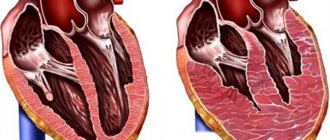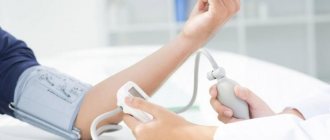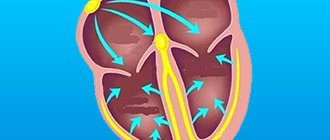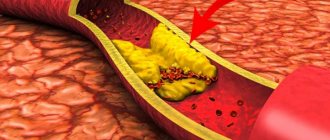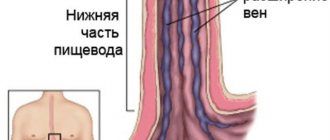The feeling of palpitations with a normal pulse is sometimes a symptom of arrhythmia, myocarditis, endocarditis, cardiosclerosis, myocardial dystrophy, hypertension, or heart disease. The reasons may be a problem with the thyroid gland, adolescence or menopause. Milder cases are ARVI with fever, stress, fatigue, stimulating drinks, smoking, gluttony.
The doctor will determine the cause using auscultation, ECG, ultrasound of the heart, and blood tests. He will prescribe treatment for the underlying disease, after which the symptom will go away. Together with the drugs Digoxin, Korglykon, Concor and others, you can drink decoctions of rose hips, lemon balm, and mint. A healthy lifestyle will help prevent the problem.
Normal heart rate and signs of increased heart rate
Most patients determine increased heart rate by the following signs:
- the heart beats loudly and seems to be trying to jump out of the chest;
- noise and response of the heartbeat in the temples and back of the head;
- darkening of the eyes, a feeling of imminent loss of consciousness;
- twitching of the little finger on the left hand;
- a pinching sensation in the area where the heart is located.
With a normal heart rate, such sensations never occur. This pathology signals chronic diseases of the cardiovascular system, which are most often psychosomatic in nature (i.e. associated with anxiety, excitement, fear).
For what reasons does a rapid heartbeat develop?
Factors that contribute to the appearance of arrhythmia and tachycardia:
- physical activity (jogging, anaerobic exercise, climbing stairs);
- taking certain drugs that cause heart palpitations;
- surges in blood pressure for one reason or another;
- mental problems, neuroticism, fear, anxiety, excitement;
- increased consumption of caffeine (it is found not only in coffee drinks, but also in Coca-Cola, Fanta);
- conditions and diseases in which the diaphragm rises upward.
These are all standard causes of palpitations. Before bedtime, they may differ in specificity. Not all patients with diseases of the cardiovascular system may experience problems at certain times of the day - this condition says a lot.
Panic attacks. Difficulties in diagnosis.
People suffering from the symptoms of panic attacks usually do not know where to turn. They visit the offices of a therapist, cardiologist, endocrinologist, psychiatrist, psychologist, but doctors do not detect any disturbances in the functioning of the body. Of course, it is advisable to undergo all possible examinations and pass all the necessary tests in order to exclude the development of serious physiological abnormalities. However, if, in the end, they tell you that you are absolutely healthy, but anxiety, tachycardia, insomnia and other symptoms continue to torment you, then most likely you suffer from panic disorder, which means the problem lies in a disruption of the autonomic nervous system , which can only be identified by an experienced neurologist-vegetologist.
Some patients with signs of panic attacks are diagnosed with vegetative-vascular dystonia (VSD) and told that they will have to live with such symptoms all their lives, alleviating them with medications: antidepressants and tranquilizers.
“I went to all the doctors because there were a lot of symptoms: my heart, shortness of breath, blood pressure, my stomach, bones, muscles ached, I felt constant anxiety. At first, rare panic attacks grew into a daily norm. The neurologist prescribed Coaxil, but the pills made me feel worse. I drank Coaxil for three months and barely got off it. Then the therapist prescribed me adaptol. It made me feel better, but only while I was drinking it, and as soon as I stopped drinking, everything started all over again. Everything was useless until I learned from friends about the “Clinical Center for Autonomic Neurology”,” patient, Arthur (46 years old).
The deep misconception that VSD and panic attacks cannot be treated can be dispelled if you visit a doctor who specializes specifically in disorders of the autonomic nervous system. Panic attacks can be treated and diagnosed! The main thing is to know where and how this can be done.
When I go to bed - strong heartbeat: reasons
Most often, this pathology is psychosomatic in nature. The appearance of tachycardia and arrhythmia at night or in the evening more than once a month should alert the patient and encourage him to consult a cardiologist, who, in turn, will most likely refer him for examination to a neurologist.
Complaints like “when I go to bed, my heart beats strongly” are most often caused by the following diseases and conditions:
- hypochondria;
- dysfunction of the vestibular apparatus;
- vegetative-vascular dystonia;
- blood pressure surges;
- hot flashes and menopause in women after forty.
True tachycardia and arrhythmia develop arbitrarily, at any time of the day. If a patient complains that the heart is beating strongly before going to bed (or at any other stable time of day), then you need to look for the roots of the problem in psychosomatics.
Prevention of myocardial problems
To prevent your heart from bothering you with loud pulsations, it is important:
- try to maintain a normal weight, as obesity overloads the myocardium and blood vessels;
- even if you follow a diet, include vitamins and foods containing magnesium and potassium;
- train your heart through sports (walking, running, cycling), but not to the point of exhaustion;
- If you have a cold, do not self-medicate, do not carry it on your feet;
- do an ECG once a year;
- be less nervous.
Strong pulsation is not a disease, but a manifestation of a problem. And you can’t ignore it, even if it bothers you from time to time. The sooner you take care of yourself, the higher the chance of restoring your previous quality of life.
Methods to normalize the heartbeat without the help of medications
Increasing arrhythmia frightens many patients (especially the elderly). They begin to panic, gasp for air, choke, and make unnecessary body movements. This behavior contributes to an even greater increase in the number of heartbeats per minute.
There is a set of simple tips and rules approved by official medicine (some of them are borrowed from hatha yoga) to normalize heart rate:
- try to take a comfortable position so that there are no creases in the body, and the spine is straight and relaxed;
- monitor your breathing: take deep breaths and exhales, trying to contract the diaphragm;
- concentrate on the point on the bridge of your nose and close your right nostril with your thumb, take a slow, deep breath in and out. Then close your left nostril with your index finger and take a few more deep breaths in and out through the right.
- in some cases, relief comes from gargling with cool water or applying a damp, cold towel to the chest and neck area;
- You should drink a glass of cool water, take a sedative tablet (in no case should you take alcohol tinctures such as Corvalol or Valoserdina) or a heart medication.
If after all these manipulations the strong heartbeat does not subside when falling asleep, you need to call an ambulance. In some cases, tachycardia can provoke many complications, which can lead to death.
Emotions affect the body. And the body - on emotions?
We are accustomed to thinking that our emotional state determines the rhythm of our heartbeat, because when we are afraid, our heart begins to beat faster. In fact, this is a two-way process: our feelings can change under the influence of signals coming from the body.
William James, who is often called the father of American psychology, wrote about the relationship between the body and emotions in his works. At the end of the 19th century, he hypothesized that emotions are just another name for bodily sensations.
For example, when our heart is pounding, this physical sensation causes a state that we call fear. In other words, it is the increased heart rate that makes us feel fear, not the other way around.
This seems reasonable. It is difficult to imagine anger that is not accompanied by characteristic external manifestations: flushing of the face, clenched teeth, flared nostrils and a rapid heartbeat. Or grief without tears, sighs and chest pain. As James said, “emotions do not exist outside the body.”
Thanks to neuroimaging, we now know that the insula also plays an important role in emotion. This fact confirms James' theory about the relationship between the body and emotions. Psychologist Lisa Feldman Barrett of Northeastern University also found evidence that emotions are determined by bodily sensations, past experiences and upbringing.
Moreover, heart palpitations can increase feelings of fear. In one 2014 experiment, Garfinkel showed subjects photographs of people with scared, happy, outraged, and neutral facial expressions. People who saw fearful faces and focused on the heartbeat at that moment reported that they experienced more intense fear.
Taking sedatives and sedatives
Since rapid heartbeat before bedtime is most often provoked by psychosomatic causes, specialists often prescribe tranquilizers and sedatives as auxiliary or primary therapy:
- "Atarax" belongs to the group of new generation tranquilizers. Promotes quick fall asleep and sound sleep. Reduces anxiety, excitement, hyperactivity.
- "Adaptol" is ideal for patients whose problems with heartbeat are provoked by a difficult life situation and constant anxiety. This is an excellent sedative, the effect of which begins already on the third or fourth day of use. The patient stops worrying about trifles and quickly falls asleep.
- "Fitosedan" is a completely natural product based on plant components. It has a sedative, sedative and hypnotic effect. has virtually no side effects. In rare cases, may cause allergic reactions.
What to do if you feel your heart beating
If you experience an unpleasant sensation, you must first do the following.
- adjust your diet . Often the cause of a rapid heartbeat is an unbalanced diet, excessive consumption of alcohol, coffee, and fatty foods.
- stop smoking . A bad habit has a negative impact on the body as a whole. The future belongs to non-smokers! If this is not the first time you have felt your heartbeat, it's time to quit smoking.
- conduct an audit of the medications used . It is possible that you are taking medications or dietary supplements that are incompatible with each other. Another possibility is side effects from medications.
- limit physical activity . Sports should be done correctly, avoiding overwork. If you cannot distribute the load correctly, you should seek the help of a professional trainer.
- find a quiet hobby . Quiet hobbies help reduce nervous tension.
This is interesting: Endosphere therapy: what it is, effectiveness, contraindications + reviews and before and after photos
Why can't you take Corvalol?
A common mistake many patients make is to take a few drops of Corvalol alcohol tincture if their heart beats strongly when falling asleep. Doctors have an extremely negative attitude towards this method of overcoming heart palpitations.
Firstly, Corvalol contains the strongest old-generation tranquilizer, phenobarbital, which causes drug dependence. The habit of old women to treat ari is not only useless, but also harmful.
Secondly, taking even small doses of ethanol has a depressant effect on the central nervous system. This not only does not reduce the heart rate, but in some cases it can provoke a mini-stroke.
Thirdly, Corvalol is an obsolete drug that should not be taken by any patient.
Taking antiarrhythmic drugs
These medications are aimed primarily at bringing the heart rate back to normal. If a patient comes to a cardiologist with the complaint “when I go to bed, my heart beats strongly,” then with a high degree of probability he will be given a prescription for antiarrhythmic drugs.
The following medications stop an attack of arrhythmia:
- potassium channel blockers (amiodarone);
- sodium channel blockers (procainamide);
- propafenol (class IC antiarrhythmic);
- and calcium channel blockers (verapamil).
These drugs have many side effects, some of which can lead to the development of toxic hepatitis. Therefore, the dosage should be increased gradually, starting from the minimum. The total duration of treatment should be prescribed by a cardiologist based on the patient’s individual medical history.
Preventive methods
If you are worried about a strong heartbeat before going to bed, you should consult a doctor and start taking medication.
What to do if the patient does not experience much discomfort and feels a very slight arrhythmia in the evening? Here are simple but effective ways to avoid it:
- an evening walk in a quiet, peaceful place (park, forest belt, field, botanical garden), during which you need to wander in silence and breathe fresh air;
- give up coffee and black tea;
- perform simple breathing exercises alternately with the right and left nostrils (it was described just above);
- do not do any physical exercise five to six hours before bedtime, do not run or jump under any circumstances, do not even walk quickly - all this provokes heart rhythm disturbances;
- exclude from your social circle people whose communication causes anxiety, excitement and other neurotic problems;
- try not to eat fatty meat foods four hours before bedtime: dinner should be as light as possible so that the gastrointestinal tract rests at night.
Panic attack. Emergency self-help.
First, learn how to manage your panic attacks yourself to control them and reduce the intensity of your panic attack symptoms.
Try practicing breathing techniques.
Breathe through your diaphragm (belly), in through your nose and out through your mouth slowly and calmly. For example, for 5 counts – inhale, for 10 – exhale.
“Some patients benefit from progressive muscle relaxation. If your muscles are very tense during a panic attack, try tightening your facial muscles: tense your jaw for 8 seconds - then relax, tense your lips for 8 seconds - relax. Repeat the exercise with your arms (palms, forearms) and switch to the next muscle group, for example, the calf muscles, the feet. Alternate tension and relaxation of all parts of the body will help relax the muscles and distract thoughts,” recommendations of a neurologist-vegetologist (“Clinical Center for Autonomic Neurology”).
During a panic attack, try to distract yourself and not think about the symptoms that are bothering you. Use psychological techniques. Visualize some place where you felt good: a house, a vacation spot, a cottage, a forest, a sandy beach - whatever your heart desires. And imagine in detail the entire environment that surrounds you there: a soft chair, a fluffy cat, the smell of pine trees, the crunch of branches under your feet, birdsong, warm sand, etc. Think in advance about where it would be better for you to “go” when you have another panic attack in order to distract your thoughts from its symptoms.
Keep a diary of panic attacks that you can refer to in critical situations. This way you can remind yourself that there is nothing to be afraid of, and the next panic attack will soon pass.
Which doctor should I see and what tests should I undergo?
With the complaint “when I go to bed, my heart beats strongly” you need to contact a cardiologist directly. This is a doctor whose specialization is diseases of the cardiovascular system.
If a patient complains of increased heartbeat, the doctor will first determine the reasons - whether it is of physiological or pathological origin. For this purpose, laboratory and instrumental studies may be prescribed, including ECG, echocardiography (ultrasound of the heart), and radiography of the heart. If the cardiologist diagnoses pathological changes in the heart, appropriate treatment will be prescribed. If no pathologies are found, and the arrhythmia continues to haunt the patient in the evenings, you should contact a neurologist.
A neurologist or neuropathologist will prescribe sedatives and sedatives. In the absence of pathologies of the cardiovascular system, most often the cause lies precisely in nervous disorders. A course of well-chosen tranquilizers in the required dosage will help completely relieve symptoms of anxiety, which most often take the form of insomnia, tachycardia and arrhythmia.
